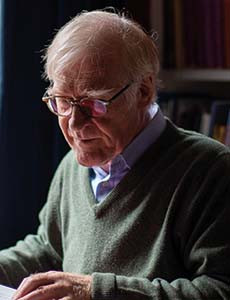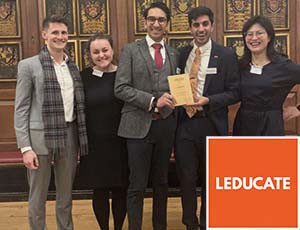*/


The clerk to the set where I had my first tenancy was one of nature’s non-commissioned officers. He expected the junior members to do what they were told. He had his limitations, but also one great positive: among the instructions which he gave the young was to attend the Mary Ward Legal Centre. Then, as now, the Mary Ward, which had premises near Chancery Lane, provided charitable assistance of various kinds. On afternoons when we had nothing else to occupy us we would go there to assist in legal surgeries. Occasionally, there was a brief in a London Magistrates’ Court. This was, said the clerk, a good way to learn.
The clients were often colourful, and ranged from the permanently destitute to the nouveau pauvre: their only common feature was that they currently had no money. I recall a clubbable man who told how he had organised his own cricket team to play games against villages. It gave me the idea to do the same thing; and for years thereafter I ran a travelling cricket team composed of friends.
I cannot recall ever hearing the expression ‘pro bono’ in those days. But performing occasional bits of unpaid legal work was something most of us did. Before long, my afternoons were filled with County Court or Crown Court hearings, so the pleasure of giving unpaid legal advice had to be confined to the evenings. I volunteered at the Richmond Citizens Advice Bureau near where I lived one evening a month for the next 20 years – until my practice had moved too far away from the mix of common problems, such as employment and landlord and tenant, about which people tended to come in.
At about that stage in my professional life the Bar Pro Bono Unit (now known as Advocate) was established. It is a fantastic organisation. From the barristers’ point of view, it cuts out so many of the problems which can arise if you try to help people informally. If you take on a case, it will already have been vetted for suitability by the Unit; the papers will already have been assembled; and your time commitment will be limited – say, a one-day court hearing, or a single Opinion.
The Unit has sent me one or two really exciting cases: I have appeared on the instructions of the Unit before a Lord Chief Justice and a Master of the Rolls. Just as important for the individuals concerned has been giving quiet, unpaid advice to people of limited means about defects in the construction of their homes. Construction had become the biggest area of my practice, and it was satisfying to be able to use expertise which I had acquired to help families who would never have been able to afford to pay for specialist legal services.
The willingness of lawyers to provide pro bono services is not a substitute for a properly funded legal aid system; but even in the golden days of legal aid in the 1970s there were gaps in what it covered. Nor does any barrister whom I know turn down fee-paid work to undertake unpaid work instead. We do it when we have space, as with last-minute settlements, and the unpredictable ebbs and flows of instructions, which all of us have from time to time.
I am sure that most barristers find, as I have done, that fitting in occasional pro bono work brings welcome variety, a real sense of fulfilment in helping people, and sometimes also sheer fun.

I know it’s corny, but I decided that I wanted to be a barrister when I got hooked on Rumpole of the Bailey re-runs on the telly. It’s fair to say that the shy, awkward, ‘wouldn’t say boo to a goose’ child I was had to admit it appeared a tall order! What I did know was that I was interested in people and their lives and had a strong sense of justice, which led to me wanting to give a voice to those who needed it. My career at the Bar, and in particular the Family Bar, has always centred around assisting people when they are at their most vulnerable and advocating for them.
Pro bono work has been a part of my practice from the beginning. When I was at Bar School in London, I undertook several cases with the Free Representation Unit. The Bar Pro Bono Unit was created in the very early years of my practice and I signed up to the volunteer panel pretty much from day one. Getting to appear in the Family Division of the High Court as a very junior barrister representing a transgender parent, who desperately wanted to have contact with her young children was particularly noteworthy.
For me, being a barrister has never been about earning a fortune or getting engrossed in technical legal issues. It’s about being able to help people who have found themselves caught up in everyday problems that have a legal context. Many of these areas (crime, family, housing etc) affect those least able to afford the services of a barrister and the availability of legal aid has always been a bit of a hit and miss affair. I feel strongly that no matter who you are or where you come from, being able to access justice is as important in our society as being able to access healthcare.
As an example, I and a colleague represented two grandparents pro bono when they were accused of shaking their baby granddaughter. As they were not the parents, they were not entitled to legal aid and as their income fell just above the cut-off point, they could not afford the representation they desperately needed.
Three medical experts gave evidence, having prepared complex written opinions, which the grandparents were at sea trying to understand. They were exemplary and experienced parents of 30 plus years and had never had cause to be involved in the justice system before now – they were frightened and felt very alone.
Myself and my colleague were able, through our representation, to assist them to navigate what would have been an overwhelming court experience.
When I moved back north from London in 2008, I was taken aback as to how little was known about the Bar Pro Bono Unit on the North Eastern Circuit and therefore referral to it as a way of assisting those who needed it was scarce. I was therefore keen to extol the virtues of undertaking pro bono work within chambers and I am delighted and proud that we now have a huge number of members who regularly undertake cases through Advocate and that assisting those who need it most to access justice is engrained in chambers’ ethos.
I was therefore truly humbled to be the inaugural winner of the John Collins Pro Bono Excellence Award and considered to be, in some small way, worthy of being classed in the same category as such a pro bono warrior. The fact that John was a member of the North Eastern Circuit, as I am, makes it even more special.

Adam Kayani, family law barrister (call 2019) at Harcourt Chambers and Director of LEDUCATE, writes:
LEDUCATE was founded in 2019 by a clutch of law graduates from the University of Nottingham who were united by the common experience of having been bombarded by an almost continuous barrage of questions from non-legal friends as to what their rights were in a myriad of situations throughout their studies. From one person who was terrified that a ticket for driving in a bus lane meant they’d get a criminal record to others exasperated that their landlord still hadn’t fixed their boiler after two months, the fundamental problem was exposed: the law is too opaque for many to understand. If people don’t understand their rights, they aren’t able to enforce them and if they don’t enforce them, they might as well not have them at all – and it was into this chasm that LEDUCATE was born.
From my perspective, as a barrister specialising in family law, LEDUCATE offers an exciting change of pace – working on longer-term projects as part of a team with multiple different stakeholders across schools, corporate partners and legal professionals. LEDUCATE offers me an opportunity to hone and develop my skills as a manager of people and to deploy my advocacy skills differently, either breaking down legal concepts to explain them to 16-year-old students or when spreading LEDUCATE’s message to bring new partners on board.
I am fortunate that having the flexibility and control of my diary as a barrister makes it easier to carve out time that I can dedicate to the various projects we have going on, around a very busy court diary. There are a lot of plates to spin but being able to be honest with all parties is vital to managing expectations and not becoming overwhelmed to the point where you’re forced to leave someone high-and-dry.
When all the stars align, however, there is no greater fulfilment than the feeling of giving back in such a tangible way. I get an enormous sense of privilege being able to be a part of dynamic, thought-provoking and often incredibly entertaining conversations with young people as they come to know more about their rights (often for the first time) across a range of important topics from consent to criminal sanctions and the constitution. It is then often a race to keep up and not be caught out by their ravenous curiosity to know more, to understand ‘why’ and to crystallise their own judgements on how society around them is fixed and what they might want to change about it.
Our team passionately believes that ignorance of the law is no defence to injustice and we were honoured that our hard work in furthering that cause was recognised by Advocate’s panel of judges. We were overwhelmed by the supportive messages and encouragement we have received from titans of the legal world, who have been an inspiration to many of us throughout our fledgling careers, and hardens us in our resolve to dig deep and push on in our mission. This award has been instrumental in highlighting to others in the profession that taking on cases for free is not the only way to deploy their legal skills and serves to prove that there are other, important, ways to strengthen and protect the rule of law in our country.
Click here to read part one of Counsel’s coverage of the 2021 Bar Pro Bono Award Winners which features Young Pro Bono Barrister of the Year Daniel Grütters; Junior Pro Bono Barrister of the Year Sarah Abram; and Pro Bono QC of the Year Anthony Metzer QC. Part two features International Pro Bono Barristers of the Year Rhys Davies and Ben Keith, Pro Bono Chambers Professional of the Year Leigh Royall and Pro Bono Chambers of the Year 12 KBW.


The clerk to the set where I had my first tenancy was one of nature’s non-commissioned officers. He expected the junior members to do what they were told. He had his limitations, but also one great positive: among the instructions which he gave the young was to attend the Mary Ward Legal Centre. Then, as now, the Mary Ward, which had premises near Chancery Lane, provided charitable assistance of various kinds. On afternoons when we had nothing else to occupy us we would go there to assist in legal surgeries. Occasionally, there was a brief in a London Magistrates’ Court. This was, said the clerk, a good way to learn.
The clients were often colourful, and ranged from the permanently destitute to the nouveau pauvre: their only common feature was that they currently had no money. I recall a clubbable man who told how he had organised his own cricket team to play games against villages. It gave me the idea to do the same thing; and for years thereafter I ran a travelling cricket team composed of friends.
I cannot recall ever hearing the expression ‘pro bono’ in those days. But performing occasional bits of unpaid legal work was something most of us did. Before long, my afternoons were filled with County Court or Crown Court hearings, so the pleasure of giving unpaid legal advice had to be confined to the evenings. I volunteered at the Richmond Citizens Advice Bureau near where I lived one evening a month for the next 20 years – until my practice had moved too far away from the mix of common problems, such as employment and landlord and tenant, about which people tended to come in.
At about that stage in my professional life the Bar Pro Bono Unit (now known as Advocate) was established. It is a fantastic organisation. From the barristers’ point of view, it cuts out so many of the problems which can arise if you try to help people informally. If you take on a case, it will already have been vetted for suitability by the Unit; the papers will already have been assembled; and your time commitment will be limited – say, a one-day court hearing, or a single Opinion.
The Unit has sent me one or two really exciting cases: I have appeared on the instructions of the Unit before a Lord Chief Justice and a Master of the Rolls. Just as important for the individuals concerned has been giving quiet, unpaid advice to people of limited means about defects in the construction of their homes. Construction had become the biggest area of my practice, and it was satisfying to be able to use expertise which I had acquired to help families who would never have been able to afford to pay for specialist legal services.
The willingness of lawyers to provide pro bono services is not a substitute for a properly funded legal aid system; but even in the golden days of legal aid in the 1970s there were gaps in what it covered. Nor does any barrister whom I know turn down fee-paid work to undertake unpaid work instead. We do it when we have space, as with last-minute settlements, and the unpredictable ebbs and flows of instructions, which all of us have from time to time.
I am sure that most barristers find, as I have done, that fitting in occasional pro bono work brings welcome variety, a real sense of fulfilment in helping people, and sometimes also sheer fun.

I know it’s corny, but I decided that I wanted to be a barrister when I got hooked on Rumpole of the Bailey re-runs on the telly. It’s fair to say that the shy, awkward, ‘wouldn’t say boo to a goose’ child I was had to admit it appeared a tall order! What I did know was that I was interested in people and their lives and had a strong sense of justice, which led to me wanting to give a voice to those who needed it. My career at the Bar, and in particular the Family Bar, has always centred around assisting people when they are at their most vulnerable and advocating for them.
Pro bono work has been a part of my practice from the beginning. When I was at Bar School in London, I undertook several cases with the Free Representation Unit. The Bar Pro Bono Unit was created in the very early years of my practice and I signed up to the volunteer panel pretty much from day one. Getting to appear in the Family Division of the High Court as a very junior barrister representing a transgender parent, who desperately wanted to have contact with her young children was particularly noteworthy.
For me, being a barrister has never been about earning a fortune or getting engrossed in technical legal issues. It’s about being able to help people who have found themselves caught up in everyday problems that have a legal context. Many of these areas (crime, family, housing etc) affect those least able to afford the services of a barrister and the availability of legal aid has always been a bit of a hit and miss affair. I feel strongly that no matter who you are or where you come from, being able to access justice is as important in our society as being able to access healthcare.
As an example, I and a colleague represented two grandparents pro bono when they were accused of shaking their baby granddaughter. As they were not the parents, they were not entitled to legal aid and as their income fell just above the cut-off point, they could not afford the representation they desperately needed.
Three medical experts gave evidence, having prepared complex written opinions, which the grandparents were at sea trying to understand. They were exemplary and experienced parents of 30 plus years and had never had cause to be involved in the justice system before now – they were frightened and felt very alone.
Myself and my colleague were able, through our representation, to assist them to navigate what would have been an overwhelming court experience.
When I moved back north from London in 2008, I was taken aback as to how little was known about the Bar Pro Bono Unit on the North Eastern Circuit and therefore referral to it as a way of assisting those who needed it was scarce. I was therefore keen to extol the virtues of undertaking pro bono work within chambers and I am delighted and proud that we now have a huge number of members who regularly undertake cases through Advocate and that assisting those who need it most to access justice is engrained in chambers’ ethos.
I was therefore truly humbled to be the inaugural winner of the John Collins Pro Bono Excellence Award and considered to be, in some small way, worthy of being classed in the same category as such a pro bono warrior. The fact that John was a member of the North Eastern Circuit, as I am, makes it even more special.

Adam Kayani, family law barrister (call 2019) at Harcourt Chambers and Director of LEDUCATE, writes:
LEDUCATE was founded in 2019 by a clutch of law graduates from the University of Nottingham who were united by the common experience of having been bombarded by an almost continuous barrage of questions from non-legal friends as to what their rights were in a myriad of situations throughout their studies. From one person who was terrified that a ticket for driving in a bus lane meant they’d get a criminal record to others exasperated that their landlord still hadn’t fixed their boiler after two months, the fundamental problem was exposed: the law is too opaque for many to understand. If people don’t understand their rights, they aren’t able to enforce them and if they don’t enforce them, they might as well not have them at all – and it was into this chasm that LEDUCATE was born.
From my perspective, as a barrister specialising in family law, LEDUCATE offers an exciting change of pace – working on longer-term projects as part of a team with multiple different stakeholders across schools, corporate partners and legal professionals. LEDUCATE offers me an opportunity to hone and develop my skills as a manager of people and to deploy my advocacy skills differently, either breaking down legal concepts to explain them to 16-year-old students or when spreading LEDUCATE’s message to bring new partners on board.
I am fortunate that having the flexibility and control of my diary as a barrister makes it easier to carve out time that I can dedicate to the various projects we have going on, around a very busy court diary. There are a lot of plates to spin but being able to be honest with all parties is vital to managing expectations and not becoming overwhelmed to the point where you’re forced to leave someone high-and-dry.
When all the stars align, however, there is no greater fulfilment than the feeling of giving back in such a tangible way. I get an enormous sense of privilege being able to be a part of dynamic, thought-provoking and often incredibly entertaining conversations with young people as they come to know more about their rights (often for the first time) across a range of important topics from consent to criminal sanctions and the constitution. It is then often a race to keep up and not be caught out by their ravenous curiosity to know more, to understand ‘why’ and to crystallise their own judgements on how society around them is fixed and what they might want to change about it.
Our team passionately believes that ignorance of the law is no defence to injustice and we were honoured that our hard work in furthering that cause was recognised by Advocate’s panel of judges. We were overwhelmed by the supportive messages and encouragement we have received from titans of the legal world, who have been an inspiration to many of us throughout our fledgling careers, and hardens us in our resolve to dig deep and push on in our mission. This award has been instrumental in highlighting to others in the profession that taking on cases for free is not the only way to deploy their legal skills and serves to prove that there are other, important, ways to strengthen and protect the rule of law in our country.
Click here to read part one of Counsel’s coverage of the 2021 Bar Pro Bono Award Winners which features Young Pro Bono Barrister of the Year Daniel Grütters; Junior Pro Bono Barrister of the Year Sarah Abram; and Pro Bono QC of the Year Anthony Metzer QC. Part two features International Pro Bono Barristers of the Year Rhys Davies and Ben Keith, Pro Bono Chambers Professional of the Year Leigh Royall and Pro Bono Chambers of the Year 12 KBW.


The Chair of the Bar sets out how the new government can restore the justice system
In the first of a new series, Louise Crush of Westgate Wealth considers the fundamental need for financial protection
Unlocking your aged debt to fund your tax in one easy step. By Philip N Bristow
Possibly, but many barristers are glad he did…
Mental health charity Mind BWW has received a £500 donation from drug, alcohol and DNA testing laboratory, AlphaBiolabs as part of its Giving Back campaign
The Institute of Neurotechnology & Law is thrilled to announce its inaugural essay competition
How to navigate open source evidence in an era of deepfakes. By Professor Yvonne McDermott Rees and Professor Alexa Koenig
Brie Stevens-Hoare KC and Lyndsey de Mestre KC take a look at the difficulties women encounter during the menopause, and offer some practical tips for individuals and chambers to make things easier
Sir Geoffrey Vos, Master of the Rolls and Head of Civil Justice since January 2021, is well known for his passion for access to justice and all things digital. Perhaps less widely known is the driven personality and wanderlust that lies behind this, as Anthony Inglese CB discovers
The Chair of the Bar sets out how the new government can restore the justice system
No-one should have to live in sub-standard accommodation, says Antony Hodari Solicitors. We are tackling the problem of bad housing with a two-pronged approach and act on behalf of tenants in both the civil and criminal courts